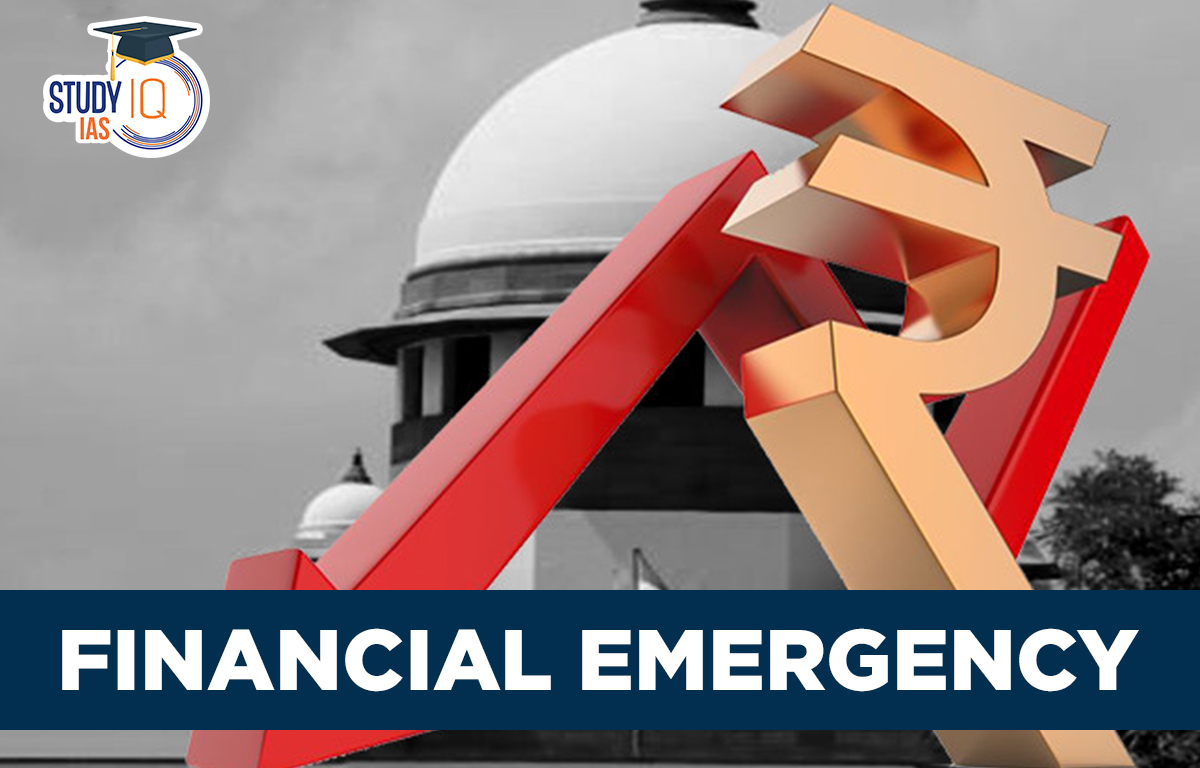Table of Contents
Financial Emergency
Part XVIII (Articles 352-360) of the Indian Constitution discusses emergency provisions. Article 360 specifically covers Financial Emergency. This is one of three types of emergencies in the Constitution. The other two are:
- National Emergency – Article 352
- President’s Rule (due to failure of constitutional machinery in states) – Article 356
The Financial Emergency is an important part of Indian Polity which an important subject in UPSC Syllabus. Students can also go for UPSC Mock Test to get more accuracy in their preparations.
Financial Emergency Meaning
Article 360 of the Indian Constitution allows the President to declare a financial emergency if the financial stability or credit of India, or any part of it, is threatened. This imposition may be in place for however long the situation requires once it has been agreed by both houses of the Parliament. Based on its policies, the Union gains the right to provide the state’s financial directives.
The President can direct states to limit the pay and benefits of government employees. Money bills and other financial bills can be sent to the President after they are approved by the state legislature. The President also has the power to reduce the salaries and benefits of Central Government members, including Supreme Court and High Court judges.
- The 38th Amendment Act of 1975 stated that the President’s satisfaction in declaring this emergency was final and could not be questioned in court.
- However, the 44th Amendment Act of 1978 removed this provision, meaning the President’s decision can now be challenged in court.
Also Read: Parliament Session
Financial Emergency Grounds of Declaration
The president has the authority to declare a Financial Emergency under Article 360. If the President determines that a situation has developed that threatens India’s financial stability or credit, or any portion of its territory. The executive and legislative authorities would be centralized in such a scenario. It also requires approval from the Parliament, much as the other two forms of emergencies.
The declaration of a financial emergency cannot be contested in court, according to the 38th Amendment Act of 1975.
The clause included by the 38th Amendment Act of 1975 that implied the president’s satisfaction was not exempt from judicial review was repealed by the 44th Amendment Act of 1978. The financial situation is currently being reviewed by a judge.
Also Read: President’s Rule
Financial Emergency Parliamentary Approval and Duration
Within two months of the date of its issuance, a proclamation stating a financial emergency must be ratified by both Houses of Parliament. If a financial emergency is declared while the Lok Sabha is being dissolved, or if it occurs during a two-month period without Lok Sabha approval, it will stay in effect until 30 days after the new Lok Sabha meets, as long as the Rajya Sabha approves it in the meantime.
The financial emergency can last as long as needed and can be ended by another proclamation. It must be approved by a simple majority in Parliament and remains in effect unless revoked. The President can also cancel the financial emergency at any time with a new proclamation.
Financial Emergency Effects
When a financial emergency is declared, the following happens:
- The Union government can direct states to follow certain financial rules.
- The President may order states to cut salaries and allowances for state employees.
- Money bills or financial bills passed by the state legislature must be sent to the President for approval.
- The President can also direct salary cuts for Union employees, including Supreme Court and High Court judges.
Financial Emergency Criticism & Significance
The Constitution’s federal structure will be destroyed, and the Union will acquire absolute control. The cornerstone of democracy will be destroyed, and fundamental rights will be rendered obsolete. Financial autonomy will be removed and all state authority will be centralized in the hands of the union management, both in the Union and in the Units. The President will get dictatorship power.
The States’ financial independence is being threatened by the financial emergency measures, according to H N Kunzru. Dr. B.R. Ambedkar, the chief architect of the Indian Constitution, also made note of the improper management and use of the Constitution’s Articles for political objectives. Emergency measures will make citizens’ fundamental rights useless, it has been noted.
Significance:
Dr. B.R. Ambedkar, one of the Constitution’s creators, explained that the financial emergency provisions were inspired by the U.S. National Recovery Act of 1933. This act gave the President the power to help the American people during the Great Depression. Such provisions in India can help manage situations like economic recessions or financial crises effectively.
Financial Emergency UPSC
The Emergency Provisions give the President broad authority to handle unusual and extreme circumstances. Any abuse of these authorities has the potential to undermine democracy. But the actual operation of the Constitution for more than 50 years has shown that, with the exception of a few instances where an emergency was imposed owing to political motives, emergency powers were largely employed in the country’s advantage.
There is widespread agreement that emergency provisions still have a role to play under the conditions in India, despite the misuse of emergency measures in several States. Students can read all the details related to UPSC by visiting the official website of StudyIQ UPSC Online Coaching.


 SLAPP Suits: Meaning, Examples, Impact o...
SLAPP Suits: Meaning, Examples, Impact o...
 Finance Commission of India, Articles an...
Finance Commission of India, Articles an...
 High Number of Pending Cases in Supreme ...
High Number of Pending Cases in Supreme ...

























